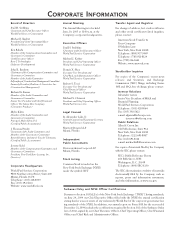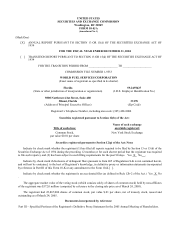World Fuel Services 2004 Annual Report Download - page 17
Download and view the complete annual report
Please find page 17 of the 2004 World Fuel Services annual report below. You can navigate through the pages in the report by either clicking on the pages listed below, or by using the keyword search tool below to find specific information within the annual report.Our business and our customers’ businesses are subject to currency exchange risks.
The majority of our business transactions are denominated in U.S. dollars. However, in certain markets, primarily in
Mexico, Colombia and the United Kingdom, payments to our fuel suppliers and from some of our customers are
denominated in local currency. This subjects us to foreign currency exchange risk. Although we use hedging strategies to
manage and minimize the impact of foreign currency exchange risk, at any given time, only a portion of such risk may be
hedged. As a result, fluctuations in foreign exchange rates could adversely affect our profitability.
In addition, many of our customers are foreign customers and may be required to purchase U.S. dollars to pay for our
products and services. A rapid depreciation or devaluation in currency affecting our customers could have an adverse
effect on our customers’ operations and their ability to convert local currency to U.S. dollars to make the required
payments to us. This would in turn result in higher credit losses for us which would adversely affect our business.
Third parties who fail to provide services to us and our customers as agreed could harm our business
We use third parties to provide various services to our customers, including into-plane fueling at airports and fueling
of vessels in port and at sea. The failure of these third parties to perform these services in accordance with the terms we
have agreed with them and our customers could affect our relationships with our customers and subject us to claims and
other liabilities which might have a material adverse effect on our business or our financial results.
We also use third parties to store our fuel inventory and to transport fuel. If these third parties become bankrupt or
otherwise fail to meet their commitments to creditors, our fuel could be seized and applied against amounts owed to such
creditors. This could cause both disruptions in our business and financial losses.
Fuel sold to our customers is purchased by us from various suppliers. If the fuel we purchase from our suppliers fails
to meet the specifications we have agreed to supply to our customers, our relationship with our customers could be
adversely affected and we could be subject to claims and other liabilities which could have a material adverse effect on our
business or our financial results.
We are exposed to various risks in connection with the price risk management services we offer to our customers.
As part of our price risk management services, we offer our customers various pricing structures on future purchases
of fuel, as well as derivatives products designed to assist our customers in hedging their exposure to fluctuations in fuel
prices. In connection with offering our customers these services, we are exposed to financial risk associated with
fluctuations in fuel prices. We typically hedge this risk by entering into a commodity based derivative instrument with a
counterparty on substantially the same terms and conditions as those entered into with our customer. Should we fail to
adequately hedge the risks associated with offering these services, or should a customer or counterparty to a derivative
instrument fail to honor its obligations under our agreements with them, we could sustain significant losses which could
have a material adverse effect on our profitability and financial position. Also, the failure of our employees to comply
with our policies and procedures concerning the administration of our price risk management services, for example by
failing to hedge a specific financial risk, could subject us to significant financial losses which could have a material
adverse effect on our business and financial condition.
Insurance coverage for some of our operations may be insufficient to cover losses.
We lack insurance coverage for various risks, including environmental claims. Although we generally require our
subcontractors to carry liability insurance, not all subcontractors carry adequate insurance. Our marine business does not
have liability insurance to cover the acts or omissions of our subcontractors. None of our liability insurance covers acts of
war and terrorism. A significant uninsured claim would have a material adverse effect on our financial position and results
of operations.
Page 5 of 72
























